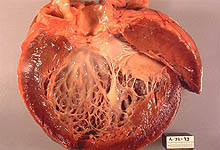Cardiomyopathy: Symptoms, Causes
and Treatment
Cardiomyopathy, which literally means “heart muscle disease,” is the deterioration of the function of the myocardium (i.e., the actual heart muscle) for any reason. People with cardiomyopathy are often at risk of arrhythmia or sudden cardiac death or both.
Although in theory the term cardiomyopathy could apply to almost any disease affecting the heart, in practice it is usually reserved for “severe myocardial disease leading to heart failure.”

Opened left ventricle of heart shows a thickened, dilated left ventricle with subendocardial fibrosis manifested as increased whiteness of endocardium.
|
SYMPTOMS:
In many cases of mild dilated cardiomyopathy, there are no symptoms. If they do occur, they usually develop over a number of years and may include fatigue, shortness of breath during exertion, palpitations (an irregular of abnormally rapid heartbeat), chest pain and swelling of the ankles.
As the disorder progresses, the heart’s pumping efficiency decreases, which worsens the symptoms.
CAUSES:
The word means “heart muscle disease.” This is a disease of the myocardium, which is the heart muscle itself. It is damaged heart muscle, which leads to enlargement of the heart.
Cardiomyopathy can be acquired or inherited. Acquired means you aren’t born with the disease, but you develop it due to another disease, condition, or factor.
Inherited means your parents passed the gene for the disease on to you. Researchers continue to look for the genetic links to cardiomyopathy. They also continue to explore how these links cause or contribute to the various types of the disease.
Many times, the cause of cardiomyopathy isn’t known. This often is the case when the disease occurs in children.
TREATMENT:
Treatment depends on the type of cardiomyopathy, but may include medication, implanted pacemakers, defibrillators, or ventricular assist devices (LVADs), or ablation. The goal of treatment is often symptom relief, and some patients may eventually require a heart transplant.
Treatment of cardiomyopathy (and other heart diseases) using alternative methods such as stem cell therapy is commercially available but is not supported by convincing evidence.
|